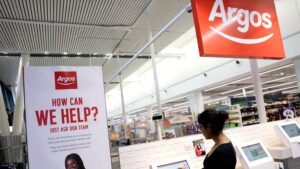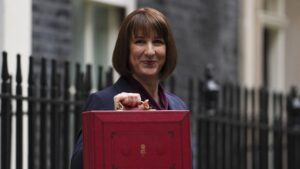What’s gone wrong at Asda?
The company’s market share dropped from 13.7% to 12.6% in the last year as of the 12 weeks to 4 August, which is an astonishing fall from grace.

While attention has inevitably been on the first rise in grocery price inflation since March last year, the latest till roll data from Kantar Worldpanel also contains valuable insights into the grocery market itself.
The figures highlight in particular the continued success of the biggest two players in the market, Tesco and Sainsbury’s, in terms of pulling away from the rest of the pack.
Money blog: Greggs wants to dominate evening meal market
Sainsbury’s, under chief executive Simon Roberts, appears to be in particularly fine fettle. Its share of the grocery market, during the 12 weeks to 4 August, came in at 15.3% – up from 14.8% in the corresponding period last year.
Much of the share that Tesco and Sainsbury’s have been taking has come from the other two traditional members of the ‘big four’ – Asda and Morrisons – although the latter, under its newish chief executive Rami Baitieh, is back to sales growth and looks to have stabilised its market share.
Executives at Tesco in particular are said to regard Mr Baitieh, a former colonel in the French Air Force who previously ran the domestic operations of French grocery giant Carrefour, with great respect.
Asda, on the other hand, looks to be in a very bad way.
An astonishing fall from grace for Asda
Its market share during the period fell to 12.6%, down from 13.7% a year ago, which is an astonishing fall from grace.
It does not seem that long ago that Asda first overtook Sainsbury’s to become the market’s second-biggest player – an event celebrated by Tony DeNunzio, Asda’s then chief executive, by giving all 125,000 UK employees an extra day off.
In fact, though, it was as long ago as August 2003 – when Asda, then owned by the US giant Walmart, had a 17% market share and Sainsbury’s was at 16.1%.
However, following a turnaround under then chief executive Justin King, Sainsbury’s recaptured the number two spot in 2013.
The pair went on to be neck and neck for most of the next few years but Asda has not had the number two spot since late 2019 and, since then, Sainsbury’s has been on top.
What happened?
So what has gone wrong at Asda?
In short, a great deal of upheaval.
In October 2020, while the pandemic was still raging, Walmart sold a majority stake in Asda – at a sum valuing the business at £6.8bn – to the private equity company TDR Capital and to brothers Mohsin and Zuber Issa who, at the time, were best-known for building a global convenience and forecourts retailer called EG Group.
With Walmart maintaining a strategic 10% stake in Asda, allowing the retailer access to its buying power, there was initial optimism.
But the financial engineering that underpinned the deal – the buyers raised £2.75bn towards the purchase by selling a bond secured against Asda’s property assets and put just £780m of their own capital at risk – meant that Asda became a heavily leveraged business as a result.
The warning signs
One did not have to go far in the City to find people concerned that Asda would lose its competitive edge as a result. The Financial Times, no less, described the brothers as embarking on a “financial high-wire act”.
An early warning sign came when, in August 2021, the well-regarded Roger Burnley stepped down as Asda’s chief executive after reportedly falling out with the brothers over strategy.
Asda failed to appoint a successor despite making overtures to several big names in the industry and, in early 2022, the search was suspended. The search is now back on again, led by headhunters Spencer Stuart, amid reports that a £10m-a-year salary is on offer to the right person.
Read more business news:
Ofgem approves UK’s biggest single grid investment for ‘electricity super highway’
Surprise fall in unemployment rate as wage growth slows down
A run of criticism
In the meantime, Asda’s high borrowing has weighed on it, something which did not go un-noticed by the Competition and Markets Authority which, in an investigation last year into whether motorists were being over-charged for fuel, singled out a loss of competitiveness at Asda – previously seen as the industry leader when it came to cutting petrol and diesel prices.
There was further embarrassment when in July last year the Business Select Committee criticised the brothers for their “opaque” accounting after an excruciating hearing during which Mohsin Issa declined to answer several questions on whether Asda had increased its profit margins on fuel since the takeover.
Stability was further undermined by constant speculation that the brothers had fallen out.
This was strenuously denied but, in June this year, Zuber Issa agreed to sell his 22.5% shareholding in Asda to TDR – giving the latter a controlling 67.5% stake. Reinforcing the sense that the brothers were going their separate ways, EG Group sold its remaining UK forecourts to Zuber for £228m, while the latter stepped down from EG Group’s board in the process.
Many of the problems with Asda’s operational performance have been laid at the door of Mohsin Issa and his comparative lack of experience in supermarket retailing.
There have been several clashes with unions over staffing levels in the business, with long-standing employees complaining at having to do too much, while a push to disentangle Asda’s IT systems from those of Walmart also created upheaval.
Losing patience
Trying to keep the show on the road and bring order to the chaos have been Lord Rose of Monewden, Asda’s chairman since 2021 and Michael Gleeson, the chief financial officer.
But even Lord Rose, a lauded figure in retailing for his leadership of Marks & Spencer in the 2000s, appears to be losing patience, telling the Sunday Telegraph at the weekend: “I am going to be perfectly honest with you. I’ve been in this industry for a long time and I am slightly embarrassed. I won’t deny that.
“I don’t like being second, third or fourth. And if you look honestly now at the comparative numbers of Kantar or whatever index, we are not performing as well as we should be. And I don’t like that.”
Declaring that Mohsin needed to relinquish day-to-day running of Asda, Lord Rose added: “We need a full-time fully experienced retail executive to come in… we always said Mohsin was a particular horse for a particular course.
“He is a disrupter, an entrepreneur, he is an agitator. We’ve added a significant number of stores and we’ve changed a lot, but it now needs a different animal.
“In the nicest possible way, Mohsin’s work is largely complete.”

Keep up with all the latest news from the UK and around the world by following Sky News
Dismay
Adding to the sense of dismay that long-time admirers of Asda must be feeling is the fact that Morrisons, whose Bradford head office is just 10 miles away from Asda’s in Leeds, appears to have turned a corner – despite, like its rival, having been acquired by private equity and loaded with debt shortly after Asda itself was.
And that has to be down to the fact Morrisons has enjoyed more stability than Asda and that, in Mr Baitieh, it has an accomplished supermarket operator at the helm and another – the former Tesco chief executive Sir Terry Leahy, now senior advisor at private equity company Clayton Dubilier & Rice, the owner of Morrisons – in the background.
The Grocer, the industry bible, wrote last week that Mr Baitieh had “galvanised Morrisons with a back to basics approach that embraces the spirit of its founder Ken Morrison”.
It went on: “Just this week, Baitieh was in Cornwall at the opening of a £12m sardines factory in Redruth – the latest sign of a lead-from-the-front approach which has seen him meet with staff on numerous store visits and wax lyrical about Morrisons’ 125-year history in addresses to workers.
“In contrast, critics say Mohsin Issa has come across as ‘frosty’ and ‘aloof’ when meeting his troops.”
Ominously, the article quoted Nadine Houghton, national officer at the GMB Union, as saying: “Asda has got a real issue with its brand and its identity.
“It has lost that sense of being the retailer that is there for working class families. I represented Wilko workers when it went into administration and there are worrying similarities. The owners seem to have lost sight of what they stand for.”
Be the first to get Breaking News
Install the Sky News app for free


Hopeful signs
All is not yet lost for Asda.
It has a number of new high-profile recruits due to join in coming months. And it also appears to be listening more to its customers, with Mr Gleeson announcing last week an increase in the staffing of checkouts.
It is impossible to avoid the sense, though, that it desperately needs a full-time chief executive and quickly.


